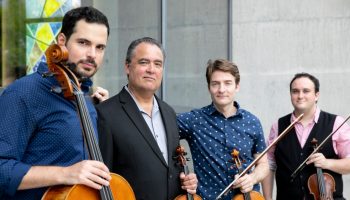
Alyssa Bump
Contributing Writer
Harmonizing through their string instruments and shared friendships, Quartet 394 will envelope Chautauquans in a state of expressive, musical euphonies.
Quartet 394 will share their repertoire at 4:15 p.m. Saturday in Elizabeth S. Lenna Hall. The performance will kick off this season’s Chautauqua Chamber Music Resident Artist Series.
The dynamic group is composed of four Chautauqua Symphony Orchestra members: Eva Stern on viola, Lars Kirvan on cello, and Jonathan Richards and Amanda Gates on violin.
“We’ve all played with each other in different combinations, but this specific combination is a first,” Stern said.
Stern and Gates have been members of the CSO for 23 years, while Kirvan and Richards have been performing with the CSO for nine seasons.
“The beauty of the Chautauqua Symphony, I find, is the repetition of playing in such a quick manner in terms of preparation,” Kirvan said. “So playing in quartets like this is actually a luxury in that we have many more rehearsals.”
Quartet 394 has been waiting to perform in unison since 2020, but the group’s debut has been postponed for three seasons due to the pandemic. Performing in a quartet gives these musicians the opportunity to try their hand at new compositions they otherwise would not be able to perform in a symphony setting.
“This is our way of individualizing what we do,” Richards said. “… This is a way to make our own impressions, our own stamps on the music.”
Saturday afternoon’s program will include Beethoven’s String Quartet No. 3 in D major, Op. 18 and Prokofiev’s String Quartet No. 2 in F major, Op. 92.
“The repertoire is beautiful,” Kirvan said. “It’s some of the most famous music out of classical music along with symphonies.”
Beethoven’s String Quartet No. 3 is his very first quartet composition from 1798, and the piece is much more classical in style than the companion piece on the program.
Prokofiev’s String Quartet is “a departure even from Prokofiev’s usual style,” Gates said. “… This (composition) is definitely more rough.”
Prokofiev pushed beyond classical boundaries when he wrote his quartet in the foothills of the Caucasus Mountains in 1941. During this time, the composer was seeking refuge from the Nazi invasion in Russia, and he was heavily inspired by the folk music of the area.
“Prokofiev was using themes he heard from the Greeks there, so it reminds one more of Bartók,” Gates said. “This guttural folk music … is infused with this sense of classiness.”
The Beethoven and Prokofiev string quartets are two “incredible pieces, but very, very different pieces,” Kirvan said. “It’s a really nice contrasting program.”
While Beethoven’s composition is bold and classical, Prokofiev’s is more humorous and exploratory in nature.
“We play in a very different style from the Beethoven to the Prokofiev,” Kirvan said. “There is less vibrato in the Beethoven, less coloration of extremes. The Prokofiev is more in your face, doing whatever you feel is artistically expressive, (which) was more acceptable for the time period.”
Week One’s theme was “On Friendship,” and the musicality of Quartet 394 is heightened by their close-knit relationship with one another. Stern and Gates have been dear friends since they joined the CSO the same season 23 years ago.
“Something special and unique to musicians is that we tend to stay in one place for a long time,” Gates said. “So we form deep roots and deep friendships wherever we are. It infuses and informs the music that you’re playing with this extra layer. … Our friendships make (our performance) an even richer experience.”
With seven Saturday chamber performances left to follow Quartet 394’s debut, Kirvan hopes their performance “whets (Chautauquans’) appetites for more chamber and orchestral music to come.”
Saturday’s program is “so diverse,” he said, “even with just the two works — that it will satisfy most listeners who will be attending, whether they’re classical music fans or first-time listeners.”




